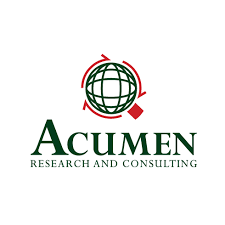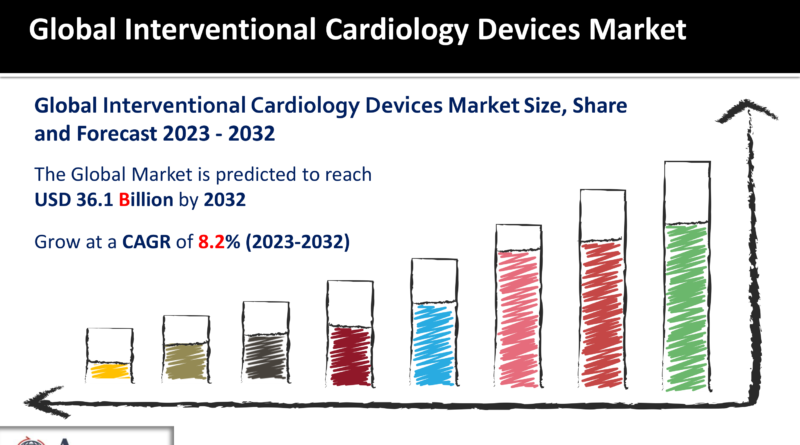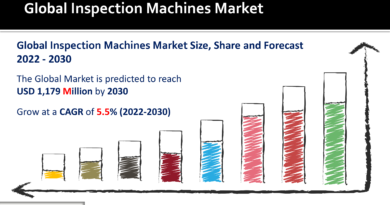Navigating the Growth Landscape of the Interventional Cardiology Devices Market
The Interventional Cardiology Devices Market Size was estimated at USD 16.7 Billion in 2022 and is projected to reach USD 36.1 Billion by 2032, registering a CAGR of 8.2% during the forecast period from 2023 to 2032.
Introduction
The Interventional Cardiology Devices Market has witnessed remarkable growth over the past few years, driven by several factors such as advancements in medical technology, increasing cardiovascular diseases, and a growing aging population. This article delves into the current market trends, drivers, restraints, opportunities, regional market insights, competition scenario, and future growth potential of the Interventional Cardiology Devices Market.
Download Free Interventional Cardiology Devices Market Sample Report Here: (Including Full TOC, List of Tables & Figures, Chart)https://www.acumenresearchandconsulting.com/request-sample/3278
 Current Market Trends
Current Market Trends
- Minimally Invasive Procedures: One prominent trend in interventional cardiology is the shift towards minimally invasive procedures. Patients and healthcare providers are increasingly opting for techniques like angioplasty and stenting, which offer quicker recovery times and reduced hospital stays.
- Emerging Markets: The market is experiencing significant growth in emerging economies due to rising healthcare infrastructure, increasing disposable incomes, and a higher prevalence of heart diseases. These regions are becoming attractive investment destinations for key market players.
- Technological Advancements: Continuous innovation in interventional cardiology devices is boosting market growth. Innovations such as bioresorbable stents and advanced imaging technologies are improving patient outcomes and expanding the market.
Market Drivers
- Aging Population: The global population is aging rapidly, leading to a surge in cardiovascular diseases. This demographic shift is a major driver of the interventional cardiology devices market as elderly individuals require more cardiac interventions.
- Rising Heart Disease Prevalence: Lifestyle factors like poor diet, sedentary lifestyles, and stress contribute to the increasing incidence of heart diseases. This trend is expected to continue driving the demand for interventional cardiology devices.
- Healthcare Infrastructure Development: Governments and private entities are investing in healthcare infrastructure development, making advanced cardiac care more accessible to patients in both developed and emerging markets.
Market Restraints
- High Cost of Devices: The cost of interventional cardiology devices remains a significant constraint, limiting their adoption, particularly in developing countries with limited healthcare budgets.
- Regulatory Hurdles: Stringent regulatory processes and approval timelines for new devices can slow down market growth and innovation.
Opportunities
- Personalized Medicine: The growing emphasis on personalized medicine offers opportunities for the development of tailored interventional cardiology devices and treatments, optimizing patient outcomes.
- Telemedicine*: The integration of telemedicine in cardiology allows for remote monitoring and consultations, enhancing patient care and creating new avenues for market expansion.
Regional Market Insights
- North America: North America dominates the interventional cardiology devices market due to a high prevalence of heart diseases, well-established healthcare infrastructure, and significant R&D activities in the region.
- Europe: Europe is a major market, driven by increasing geriatric population and government initiatives to promote advanced cardiac care.
- Asia-Pacific: The Asia-Pacific region is witnessing rapid market growth due to rising healthcare investments, a large patient pool, and increasing awareness of cardiovascular health.
Competition Scenario
The interventional cardiology devices market is highly competitive with key players including Abbott Laboratories, Medtronic, Boston Scientific, and Johnson & Johnson. These companies invest heavily in research and development, mergers, acquisitions, and partnerships to maintain their market positions.
Future Market Growth Potential
The future of the interventional cardiology devices market appears promising. Advancements in technology, the growing incidence of cardiovascular diseases, and expanding healthcare infrastructure will continue to drive market growth. Furthermore, the shift towards personalized medicine and the adoption of telemedicine present exciting avenues for innovation and expansion.
The Interventional Cardiology Devices Market is on a trajectory of sustained growth, fueled by a combination of factors such as demographic shifts, technological innovations, and increased healthcare investments. While challenges like high costs and regulatory hurdles persist, the opportunities presented by personalized medicine and telemedicine are paving the way for a brighter future in cardiac care. As key players continue to invest in research and development, the market is expected to evolve, offering improved treatments and outcomes for patients worldwide.
Get Discount On The Purchase Of This Report:https://www.acumenresearchandconsulting.com/buy-now/0/3278
Find more such market research reports on our website or contact us directly
Write to us at sales@acumenresearchandconsulting.com
Call us on +918983225533
or +13474743864


